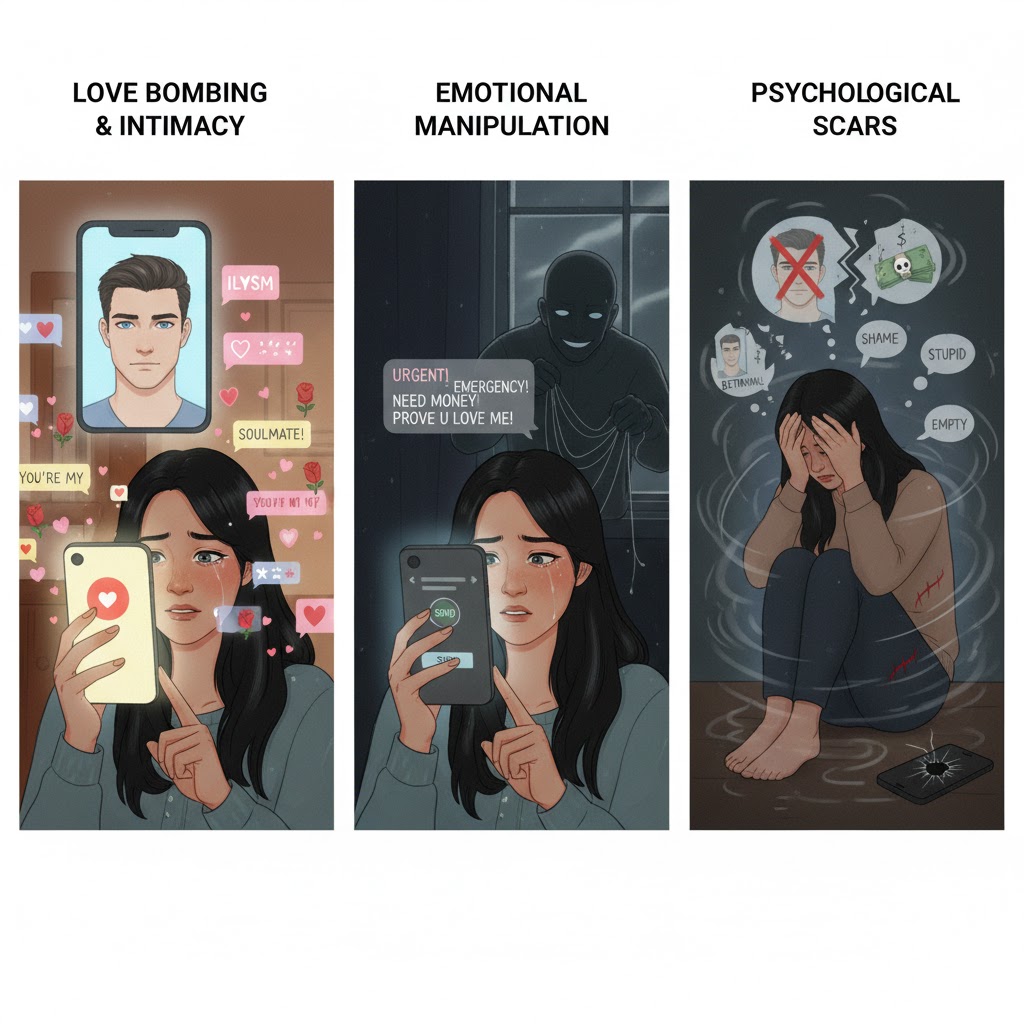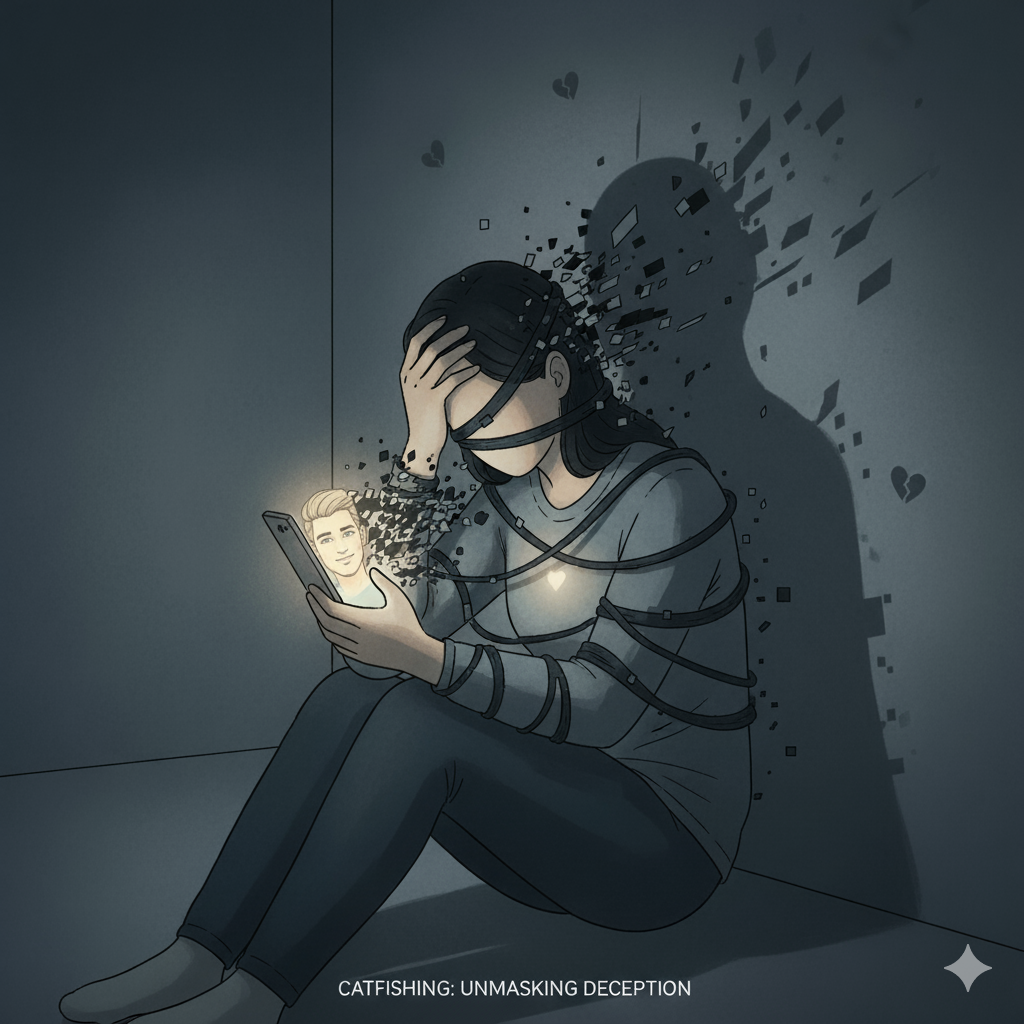Catfishing Counselling in Singapore
Catfishing – the act of deceiving someone online by adopting a fake identity – can have devastating emotional consequences, leading to anxiety, depression, and deep trust wounds. This article explores the psychology behind catfishing, its impact on victims, and neuroscience-backed strategies for healing and protection. Learn how to safeguard yourself from online deception.

Catfishing and Its Emotional Impact: Protecting Yourself from Online Deception
Have you ever felt the sting of online betrayal?
You thought you were building something real – perhaps a friendship, a romantic connection, or a trusted mentorship. But then, the truth surfaced. The person you confided in, the one who seemed to understand you so deeply, was not who they claimed to be.
The emotional fallout from catfishing is profound. It triggers a unique kind of betrayal trauma, where trust is shattered, and the brain’s stress response is activated. Victims often experience anxiety, depression, PTSD-like symptoms, and even difficulty forming relationships in the future.
So how do you heal from the trauma of catfishing? And more importantly, how can you protect yourself and your loved ones from becoming victims in the first place?
The Psychology of Catfishing: Why Does It Happen?
Catfishing isn’t just casual deception, it’s a complex psychological behaviour that often stems from underlying emotional issues. While some perpetrators engage in catfishing for financial scams or predatory purposes, others do so out of loneliness, insecurity, or even dissociation from their real identity.
Catfishing is a serious form of online fraud that preys on our fundamental human needs for connection and affection. The scammer (or “catfisher”) meticulously builds a false persona, often using stolen photos and fabricating a compelling life story, to “groom” the victim. This process can take months, establishing a deep, trusted, and often romantic or intensely friendly bond before the actual scam begins.
The deceit typically unfolds when the scammer introduces an urgent, desperate situation – a sudden medical emergency, a travel crisis, or a dire investment opportunity – that requires the victim to send money. Because of the intense emotional investment the victim has made, the request feels like a plea from a genuine partner or friend, making it difficult to refuse.

Heal and Rebuild: Your Path Beyond Catfishing Trauma
When the trust you placed in someone is shattered, your emotional and psychological foundations can be shaken. Healing from catfishing trauma is not just about moving on; it’s about rebuilding your sense of self-worth and safety. This is where professional help becomes vital.

Why SG Counselling is Essential for Catfishing Victims:
Validating the Trauma: Catfishing trauma is often minimised by others (“it was just online”), which can lead to feelings of shame and isolation. As specialist counsellors, we validate your pain, acknowledging that your emotional investment was real, and the betrayal is a genuine source of trauma.
Addressing Deep-Rooted Symptoms: We provide evidence-based strategies, including techniques like Cognitive Behavioural Therapy (CBT) and trauma-informed care, to treat symptoms such as:
Persistent Anxiety and Hypervigilance: The constant fear of being deceived again.
Depression and Grief: Mourning the loss of the fake relationship and the emotional investment you made.
Trust Issues: Difficulty forming healthy, genuine bonds in the future.
Creating a Safe Healing Space: Our sessions offer a non-judgmental environment to process the feelings of anger, humiliation, and self-blame that often follow the discovery of a catfish. We help you separate the scammer’s actions from your own vulnerability and goodness.
Developing Future Protection Strategies: Healing involves more than just processing the past. We work with you to develop stronger, healthier boundaries and learn neuroscience-backed tools for self-protection, empowering you to navigate the digital world with confidence and discernment, not fear.
If you or a loved one is struggling to cope with the emotional aftermath of a catfishing incident, please know that you do not have to carry this burden alone. Seeking help is the first courageous step toward reclaiming your trust and emotional well-being.